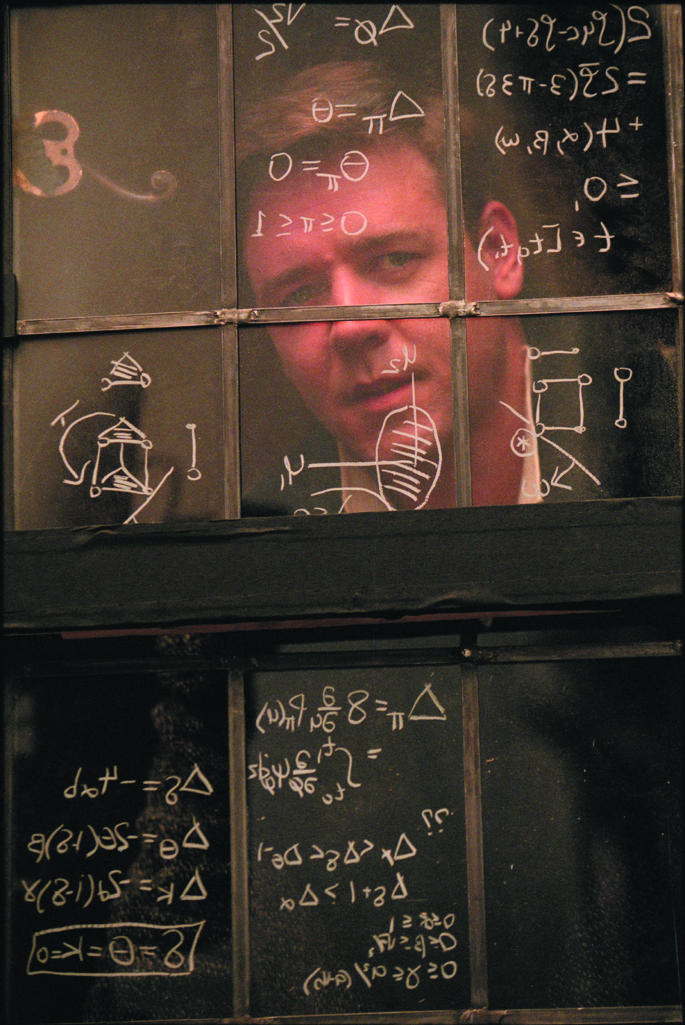A Beautiful Mind. Directed by Ron Howard. A film from Dreamworks Pictures/Universal Pictures/Image Entertainment. UK release date: West End cinemas from 22 February, nationwide from 1 March. Rating: ★★★
This film, “inspired by events in the life of John Forbes Nash,” is a true life fantasy. Nash is a lucky man. Firstly, he overcomes schizophrenia. Then he wins the Nobel prize for economics. And then he finds himself portrayed by Hollywood's hottest heartthrob, Russell Crowe.
The setting is the Ivy League universities on the east coast of the United States in the 1950s and 1960s, a time when science and mathematics were sexy. Einstein was the campus idol. The US psyche was, however, troubled. Lurking behind the optimism was the H bomb and the cold war. America's predominant mental state was one of anticommunist paranoia.
In such a mad world, the awkward, gauche maths prodigy from West Virginia, John Nash, found his niche. For someone who could produce mathematical formulae to explain apparently random behaviour and who could reduce human interaction to the rules of a game, it was a small step to seeing meaningful patterns in the random outpourings of newspapers and magazines—hidden messages from Soviet spies, warnings of Armageddon. Years of partially successful psychiatric treatment followed. This, combined with Nash's own brand of do it yourself cognitive therapy, led not so much to a cure but to a useful recovery. His early intellectual contributions took on contemporary relevance and the plaudits followed.
The film lures us unsuspectingly into an elaborately constructed, impressively realised, three dimensional psychotic world. Fortunately, I have never viewed psychosis from the inside but judging from the hundreds of accounts I have been given and hear every day, it is not like this. The hallucinations of schizophrenia are fragmented and disembodied, as are the delusions that sustain them. On the other hand, seeing significance in the mundane and the struggle to find order amid chaos are common enough. The film does convey the palpably real pain of family and loved ones and how the loss of potential and opportunity follows invariably in the wake of this terrible illness. Psychiatry, in the end, is not portrayed unsympathetically. The drugs do work—albeit with side effects—and they are getting better.
A Beautiful Mind is an engaging and compassionate film. It nevertheless manages to reinforce most of the enduring myths about severe mental illness, not least the link between genius and madness, the healing properties of the love of a good woman, and the brutality of some psychiatric treatments. Enduring because all, save perhaps the first, have some basis in reality. Furthermore, you can't really blame the screenwriter and director. Imagine trying to pitch a more realistic tale to the studios: “There's this average guy, well, a bit below average actually, who doesn't really achieve anything special and then he gets schizophrenia. He recovers a bit but then gets ill again. Things go up and down, then he dies.” Would you go and see it?
Those who have read Sylvia Nasar's scholarly biography of Nash (Faber and Faber, 1999) will miss the attempt to demystify some of his mathematics, whose origins remain as spooky and ineffable as his madness in the film. They may also note the odd discrepancy between book and film. No mention is made of the fact that Nash's son, also a talented mathematician, also had schizophrenia.
The confusion between fantasy and reality is at the heart of this film and John Nash's amazing story. It is both its subject and object. But the inescapable fact is that it's about a guy with schizophrenia and it has a happy ending.
Figure.

© 2001 UNIVERSAL STUDIOS AND DREAMWORK LL/ELI REED
Winning formula? Russell Crowe as John Nash


